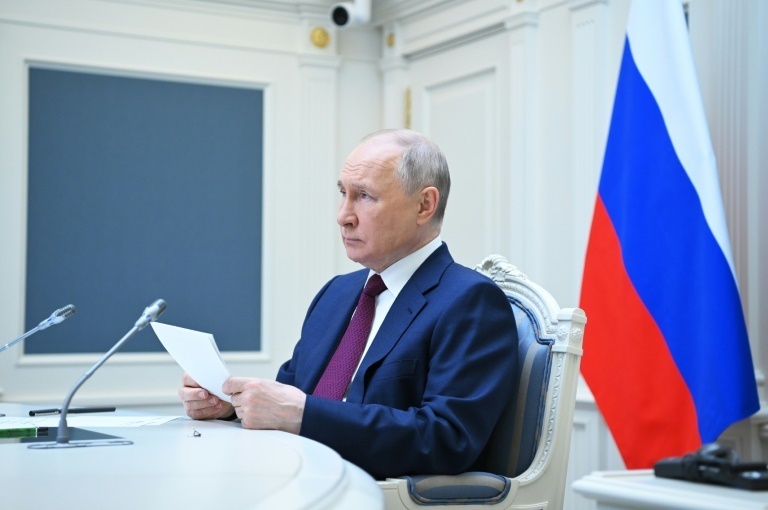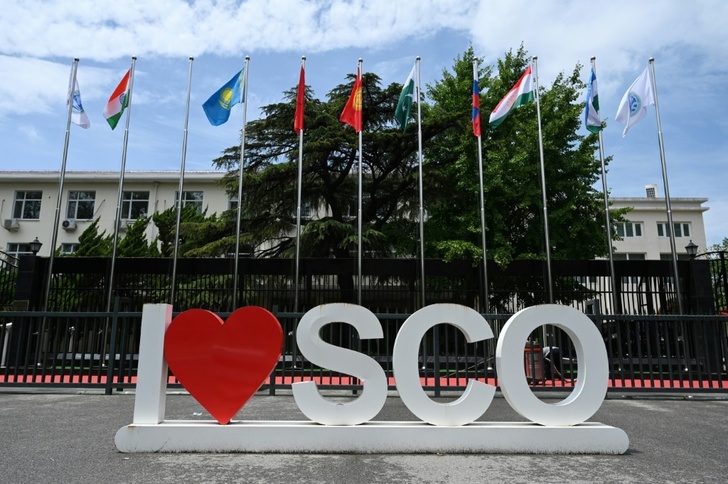China's Xi Jinping urged the leaders of Russia, Iran and other Shanghai alliance states on Tuesday to boost ties and resist sanctions, as Vladimir Putin thanked the bloc for support during a failed rebellion.
Xi "called for efforts to safeguard regional peace and ensure common security", state news agency Xinhua said, adding that he urged member states of the Shanghai Cooperation Organisation to "enhance their solidarity".
Putin thanked the Beijing-headquartered SCO, joining his first summit since a short-lived mutiny last month after the head of the Wagner mercenary group, Yevgeny Prigozhin, led a failed rebellion against the Kremlin.
"Russia is confidently resisting and will continue to resist external pressure, sanctions and provocations," Putin told the bloc.
"I would like to thank my colleagues from the SCO countries who expressed support for the actions of the Russian leadership to protect the constitutional order and the life and security of citizens," Putin added.
China and Russia have in recent years ramped up economic cooperation and diplomatic contacts, with their strategic partnership having only grown closer since Moscow's invasion of Ukraine.
While China says it is a neutral party to the Ukraine conflict, it has been criticised by Western nations for refusing to condemn Moscow's offensive.
- Afghanistan concerns -
The SCO summit -- which on Tuesday welcomed Iran as its ninth member -- also saw an apparent dig by India's Prime Minister Narendra Modi at arch-rival but fellow SCO member Pakistan.
"Some countries use cross border terrorism as an instrument in their policies, (they) give shelter to terrorists," said Modi, the host of the virtual meeting, without naming specific nations.

Pakistan also took part in the summit, with Prime Minister Shehbaz Sharif condemning the "hydra-headed monster of terrorism and extremism", while warning that "any temptation to use it as a cudgel for diplomatic point scoring must be eschewed".
Both India and Pakistan said Afghanistan remained a key concern, with Modi warning of the risk it was a base to "spread instability", while Sharif called for an "urgent reset" in international engagement with its Taliban rulers.
- Iran joins, Belarus next -
Created in 2001 to discuss security and economic matters, other SCO members are Kazakhstan, Kyrgyzstan, Tajikistan and Uzbekistan.
Iran also joined as a full member of the grouping, with Tehran having intensified its diplomacy with friends and foes alike in recent months, seeking to reduce its isolation, improve its economy and project strength.
Russian ally Belarus, which holds observer status, was also told it would become a full member at the next SCO summit.
Encompassing a vast stretch of the globe from Moscow to Beijing, the bloc makes up around half the world's population -- when including both member states as well as observer and "dialogue partner" nations.
India, which also hosts the G20 summit in September, is walking a diplomatic tightrope.
Uniquely, it is a member of both the Shanghai Cooperation Organisation and the Quad, set up with the United States, Japan and Australia to counter Beijing's growing assertiveness.
Modi was last month hosted in Washington with the full pomp of a state visit, where US President Joe Biden spoke of "two great friends and two great powers".
At the same time, Moscow remains by far India's biggest arms supplier -- they have been allies for decades -- and New Delhi has been an enthusiastic buyer of cut-price Russian oil during the war in Ukraine.
India, with a rapidly growing economy, has surpassed China as the world's most populous country and has a long-running territorial dispute with Beijing.
burs-pjm/sco
© Agence France-Presse
Your content is great. However, if any of the content contained herein violates any rights of yours, including those of copyright, please contact us immediately by e-mail at media[@]kissrpr.com.
Source: Story.KISSPR.com

